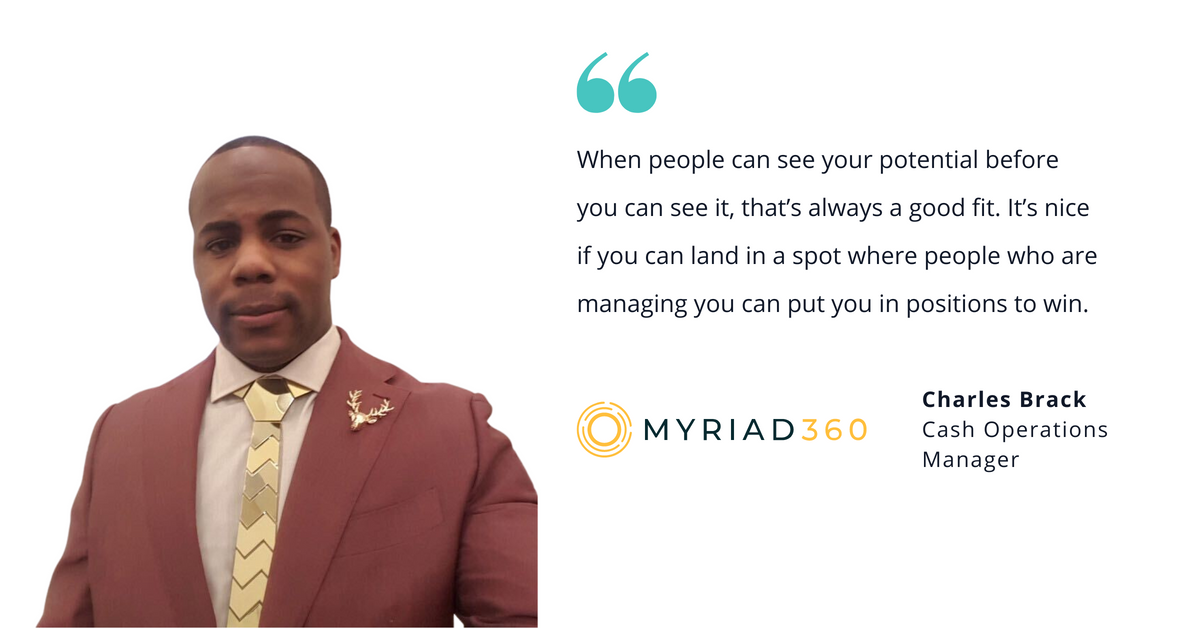When Charles Brack was interviewing at Myriad360, he said something quite bold.
The company’s CEO and CFO were sitting across from him. “What aspirations do you have for your career?” the CFO asked.
“To have your job,” Charles answered without hesitation.
He and his now-boss — the CFO in question — both smiled. And now, after nearly 16 years at the IT consultancy, where he is currently the cash operations manager, Charles knows that part of his long, rewarding career has been built on the honesty he first walked into that interview room with.
“Myriad likes that the folks they bring in have that level of ambition,” he says. “In a small company, saying I’m going to be the CFO is a big statement because that opportunity may have to develop over time. But to say that early on, and then keep the drive up to this point, has been key to my growth. And Myriad has matched that energy, so to speak.”
We asked Charles to tell us more about how he grew his career from the U.S. Army to the world of IT and how Myriad360 has facilitated that growth — including what advice he has for others looking to make the most of their own career paths.
The importance of mentors
Charles Brack got into accounting in high school — and by accident.
He founded and led a diversity club at his school, and the club’s advisor was also the career counselor. The advisor organized classes in bookkeeping and accounting and suggested Charles check them out.
Charles did, and ended up banking some credits towards graduation. But in an unexpected twist, after he completed the classes, the advisor reached back out with another idea: Charles working at their local City Hall.
“He had this opportunity, and thought of me,” remembers Charles. “He was in my ear about it early on. I picked up the books and was interested, and that became my career.”
Taking a chance
Charles’ career got its start with the help of a hands-on mentor. And it got its key pivot, too.
After serving for eight years in the U.S. Army, Charles knew he wanted to get back into civilian work. “Being a veteran only gets you so far,” he says. “And the job market was really difficult then. I must’ve sent out 200 resumes.”
One of the two companies that responded to his flurry of resumes was Myriad360. They were looking for a bookkeeper and were open to interviewing Charles even though he didn’t have formal education in the field at the time. (That’s since changed — he’s completed a bachelor’s and an MBA while working for Myriad360.)
After Charles had the fateful interview mentioned above, he received a job offer.
“They took me out of a dark place I was in, and I’ve always felt almost an indebtedness to them for that,” explains Charles. “When people can see your potential before you can see it, that’s always a good fit. It’s nice if you can land in a spot where people who are managing you can put you in positions to win.”
And as his responsibilities grew and trust deepened, Charles found himself with another solid mentor: his boss.
“The CFO’s my coach now,” says Charles in a full-circle reflection. “If he has an issue he needs me to solve, I’ll present my findings and we’ll talk through it. Our relationship has evolved over the years from less micromanaging to more problem- and solution-orientation.”
3 tips to grow your career
Charles took the job as a bookkeeper 16 years ago because he needed it, and he’s stayed because Myriad360 has turned out to be a place that supports him both at work and beyond.
For instance, Charles has taken advantage of his company’s flexible work policies to complete not one but two degrees while working full-time.
Whether higher education is on your dance card or not, Charles has some tips for making the most of the growth opportunities wherever you are:
- “Be okay with starting at the ground level,” says Charles. He references accounting specifically: “A lot of times we get our degrees and think bookkeeping is beneath us. But it’s a really good tool to have because you never really stop bookkeeping. Your role may change, you may do more complex things, but you never stop bookkeeping.”
- “Create skill sets that distinguish you. That’s what helped me stay at the same company but also grow,” says Charles. That can be getting a degree, but it’s just as important, he adds, to learn new skills or take on tasks that others don’t want or aren’t prepared to do. “The question is: what can you offer the company that those other people cannot?”
- “Never stop learning. The rules change every year, so you almost can't afford to stop learning. The moment you don't pay attention to something in the finance world is the moment that your employer decides they’re going to switch something up. Stay on top of it.”




